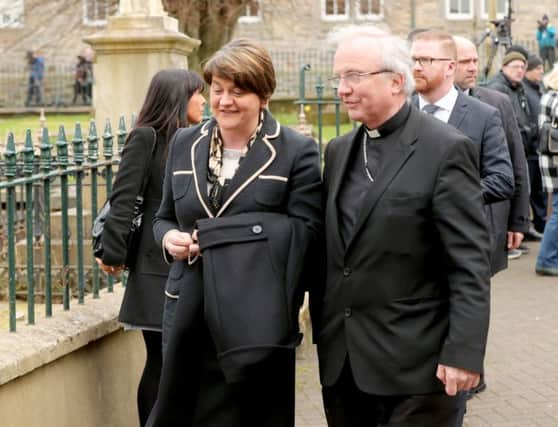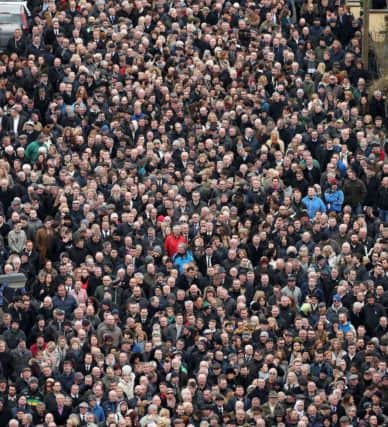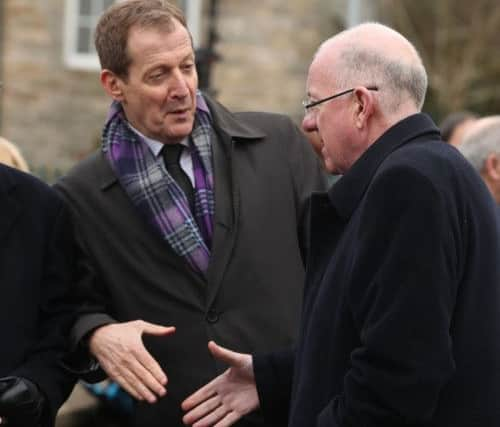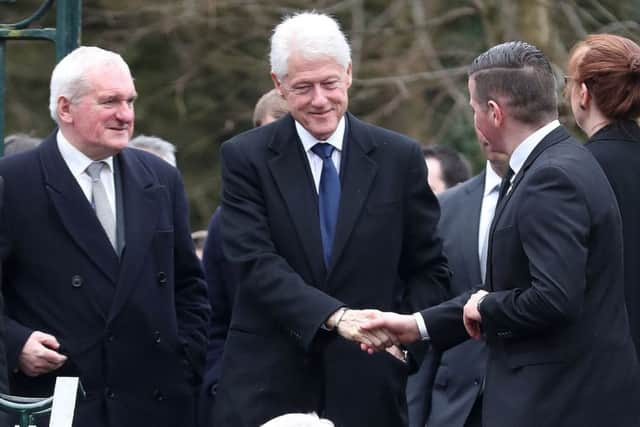'˜There was something there, in the Derry air'


“Of all the moments in my 27 years of journalism, applause for Arlene Foster at the funeral of Martin McGuinness is right up there”.
So remarked Sky News Ireland correspondent, David Blevins, after one of Northern Ireland’s most important funerals in years.
Advertisement
Hide AdAdvertisement
Hide AdBlevins wasn’t alone in being wrong-footed by this turn of events. This was, after all, the funeral of a former IRA commander, held in a staunchly nationalist city during the uncertain aftermath of a landmark and divisive electoral contest.


An election in which the leader of the DUP had increased her party’s support by baring her teeth at aspects of Irish culture and republicanism. And a funeral where speculation had been rife in advance as to whether, as a double childhood victim of IRA violence, she would even attend what must have felt like a step into republicanism’s crocodile enclosure.
Expectations had pre-ordained Martin McGuinness’ funeral to be more likely to harden hearts than open minds. Yet the people of Derry understood the political, symbolic and personal effort involved in Arlene Foster’s attendance, and they made sure she knew it was appreciated. Her entrance was greeted with a spontaneous standing ovation and a second round of applause followed when Bill Clinton referenced her in his eulogy later. Remarkably, people queued up outside the church to thank Arlene for attending and to clamour for photographs with her.
It was Northern Irish politics’ very own wartime Christmas truce moment. And the world reacted with wonderment.
Advertisement
Hide AdAdvertisement
Hide AdEvents unfolding in such an unexpectedly positive manner surprised many, but not those who know Derry well. Since partition, the city and its people have had much to feel resentful for. Whilst the pre-1972 Northern Ireland Government routinely discriminated against Catholics as a whole, no town or city faced the level of institutional injustice that Derry did.


For centuries the city had been unionism’s Jerusalem - a place they were determined to retain control over in the face of demographic reality. And it came at a huge cost to the city and its people - through gerrymandering and ghettoisation of its Catholic population, physical isolation via the running down of its infrastructure and the wilful neglect of its economy as a whole.
For years, unionist politicians seemed happy to see Derry ruined, so long as it could remain their ruin. Little surprise, therefore, that it was where the Northern Ireland civil rights movement began in the late 1960s and where the first spark of the Troubles was lit shortly afterwards.
Whilst Derry’s darkest days are over, there remains even now an element within unionism which seems surreptitiously to promote an ongoing punishment-by-neglect for this lost citadel.
Advertisement
Hide AdAdvertisement
Hide AdDerry has much to feel aggrieved about within its past, and more still regarding its present.


Yet, despite this, Derry has led the way in recent years on ways to try to bridge the religious and cultural divide that fractures the North. Take parades. Throughout the Troubles, the twice annual Apprentice Boys of Derry marches had been a source of division within the city - with even NI’s thirty year conflict itself triggered by the aftermath of one such parade in 1969. Yet, for over a decade now, tens of thousands of loyalists have been able to march through the heart of this nationalist city every six months without real incident or opposition.
The tolerance shown towards the Apprentice Boys parades taking over Derry’s city centre twice a year is simply unparalleled within Northern Ireland.
Likewise, when it comes to Irish culture. Fleadh Cheoil na hEireann - the world’s biggest celebration of Irish music - was held in Derry in 2013 amid fears that the event would see trouble and division. Instead, critics were confounded as more than 400,000 visitors contributed to a mardi gras atmosphere in the biggest Fleadh ever held. The event surprised further when its local organising committee proactively sought the involvement of the loyalist and unionist community within it.
Advertisement
Hide AdAdvertisement
Hide AdAnd, when it comes to sport - an arena marred by much division within Northern Ireland - the city similarly strives for inclusivity. Martin McGuinness was well known as a supporter of Derry City FC. The Candy Stripes are located in a strongly nationalist area of the city, play in the Republic of Ireland’s league and are generally labelled as a ‘Catholic’ team. Yet, despite this, it is rare, indeed, to see Irish flags displayed by the home fans at Brandywell Stadium.


Instead, Derry City’s fan culture has, for years, focused on the team’s red and white colours in a conscious attempt to eschew the sectarian symbols that are commonplace at other stadia in the North.
There are other examples, too, but none of this is to suggest that Derry is a problem-free poster boy for a shared society. It isn’t. The gradual retreat of the city’s Protestant population to the eastern side of the River Foyle throughout the Troubles may have spared Derry from much of the internecine conflict that afflicts Belfast. But it was a silent tragedy none-the-less and one that will take years to reverse.
So, when Arlene Foster entered Long Tower Church to a standing ovation, it was just the latest example of a city that refuses to cling to the conflict and hurt that history and current circumstances dictate it should. The only real surprise to those who know Derry is that it has taken the rest of Northern Ireland so long to finally notice.